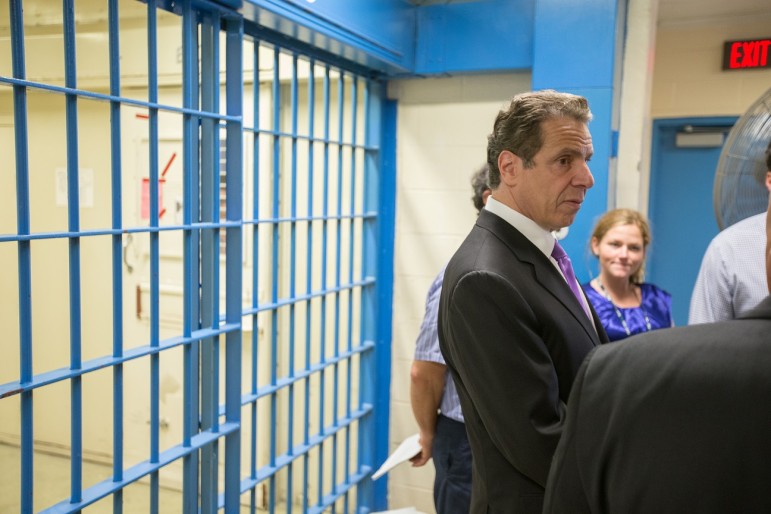
Office of the Governor
Gov. Cuomo has put his weight behind reforms many tenant leaders wanted. Now the question is whether he can deliver those changes, and at what price.
For months tenant advocates have waited and wondered what Gov. Cuomo’s position on rent regulations would be. Now they’ve gone from wondering where the governor stands to fretting about whether he can deliver.
Over the weekend, an op-ed by Cuomo called for the state’s rent laws to be renewed.
Significantly, Cuomo pledged to hold a special session until “tenant protections” are extended and strengthened. Cuomo wrote of the need to end vacancy decontrol—where vacant apartments are withdrawn from regulation because rent exceeds a certain amount—and to reform the system of improvements landlords can make where tenants are forced to pay forever, long after initial investments have been recouped. He also called to “limit vacancy bonuses to ensure landlords aren’t rewarded financially for schemes to force tenants out. These should be foundational elements of any new rent regulation legislation.”
Cuomo’s support of tenants has been considered tepid at best, and his links to the real-estate industry are well-documented. Real Rent Reform, a coalition of tenant groups, said Cuomo was finally singing their tune. “What the Governor proposes … are exactly what tenants need. That is why they are the exact points we have been making for years as the minimum steps necessary to fix the worst loopholes in the rent laws.”
Whether those changes will actually be made depends on what Cuomo, Democratic Assembly Speaker Carl Heastie and Senate Republican leader John Flanagan has out in negotiations as the clock ticks to rent regulations’ expiring next Monday. Those talks will likely concern not just rent regulations but also 421-a and Cuomo’s desire for an education tax credit.
Assemblymember Linda B. Rosenthal, long a pro-tenant leader in the lower house, says Cuomo will have no excuse if the changes he supports aren’t implemented. “With his abilities to be persuasive, he can deliver when he wants to like with same sex marriage,” she told City Limits. “It’s his state. He cannot blame anyone else if it doesn’t happen. He’s staked a claim.”
“There is a path to it. He has to not only say the right thing but do it,” she adds.
Rosenthal said she’d prefer that 421-a and the education credit not be negotiated in tandem with rent regulations.
Ava Farkas, executive director of the Metropolitan Council on Housing, says in an email Cuomo’s political prestige is on the line.
“Honestly, not that long ago, the Governor without question called all the shots in Albany. Now key staff have left, his poll numbers are dropping, and more people are willing to publicly stand up to him,” she writes. “So in that context, his recent embrace of stronger rent laws is a bold but risky position to take if he’s anything less than serious about making it happen. If he delivers, he’s a hero to millions of tenants and he will have re-established his dominance over Albany. If he fails – especially after so publicly putting his brand on it – it tells that State and the political world that his time as the ultimate power broker is over.”








6 thoughts on “Cuomo’s Power Tested on Rent Regulations”
The problem that he has is that everyone knows that the rent regulations are terrible for most NYers — they drive free market rents higher, inefficiently use housing, and cause RS buildings to pay less property tax than they would in a free market system; they also can cause landlords to abandon property.
He needs the support of the NY tenants (and Heastie), but if he has national ambitions, defending the right of a 38 year old to pay $600/month living in his grandmother’s 4-br rent controlled apartment is going to have some seriously negative optics.
the landlord always has a right to offer cash for the lease………truthfully its only fair….he paid far less then full price when he bought the building with the stabilized apartments, and will reap a huge windfall getting rid of the RS tenant…so the tenant should share in the gain….
Not sure that this is relevant. A guy paying 1/3rd of market rate for a rent stabilized apartment means that the landlord is paying 1/3rd of market rate property taxes for that apartment. This shifts the tax burden to everyone else (me included!).
But you are correct in that if the LL gets lucky, most his gain will be capital gains from the property appreciating in value, rather than income from rentals, giving him a form of tax-advantaged speculation (though he can also lose $$$$$, or run out of money waiting for the tenant to leave).
BTW: one R/S tenant got a $17mm buyout, which is totally unconscionable.
i will say this again for the last 15 year the problem has always been landlords can upgrade an apartment and spare no cost because they can always increase the rent 1/40 per month….. the amount of viking $3000 stoves on the 5th or 6th floor walkups were amazing the last time i looked for an apartment….no one just puts in a $300 sears stove anymore
second housing advocates were totally clueless on how easy it is to get a $500 apartment to $1500 legally….just rent to the dumbest tenants you can find students divorcees people that wont stay for 20 years then upgrade and add 20% for each turnover ….its easy.
We’ve seen some pretty ridiculous stuff as well… jaccuzis in studios, apartments combined or divided to get them out of rent controls, etc. There’s a strong bias towards renting to high income people who will leave soon (e.g. not to families with kids), which just shows that dictating the price of the initial rent has really bad consequences for the city. CAlifornia allows LLs to rent at market rate; in NYC, owners of vacant low-rent apartments often try to combine them rather than do crazy and wasteful renovations.
Pingback: Tenants Rally in Albany for tougher Rent regulation Laws | brooklyn laundry social club